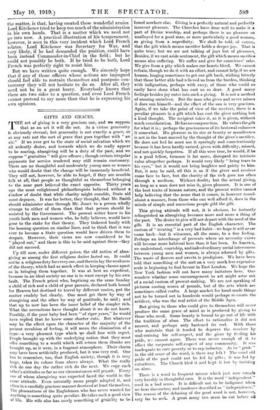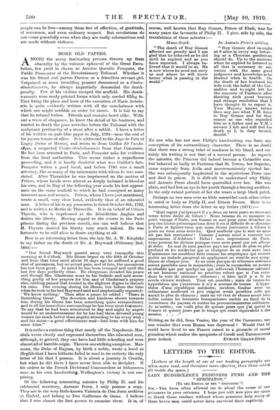GIFTS AND GRACES.
THE art of giving is a very gracious one, and we suppose that as an art it will die out. As a virtue generosity Is obviously eternal; but generosity is not exactly a grace, or at any rate not the sort of grace that goes together with " an air." If we ever get to the state of social salvation which we all ardently desire, and towards which we do really appear to be soaring, almsgiving will be a duty of the past, and we suppose " gratuities " will give offence ; though certain irregular payments for service rendered may still remain customary. There are no thoughtful and moderately young men or women who would doubt that the change will be immensely beneficial. They wilt not, however, be able to forget, if they are sensible folk at all, that people as thoughtful as themselves belonging to the near past believed the exact opposite. Thirty years ago the most enlightened philanthropists believed without a shadow of doubt that while charity might ennoble, State aid must deprave. It was far better, they thought, that Mr. Smith should administer alms through Mr. Jones to a person wholly strange to either of them than that that person should be assisted by the Government. The present writer knew in his youth both men and women who, he fully believes, would have gone to the stake for that theory. They tinkered busily with the housing question on similar lines, and to think that it was ever to become a State question would have driven them to despair. However, their views are now considered to be " played out," and there is this to be said against them—they did not succeed.
rp till now, under different guises, the old notion of alms- giving as among the first religious duties lasted on. It could not be a religious duty for every one, and therein lay the weakness of the theory, which had as much effect in keeping classes apart as in bringing them together. It was at best an expedient, because in an ideal society no one is in want except by his own fault. The French priest who, baptizing on the same Sunday a child of rich and a child of poor parents, declared both bound for Heaven but destined to travel by different routes, put the matter crudely but clearly. One must get there by way of almsgiving and the other by way of gratitude, he said ; and that up to now has been the inner belief of the simpler rich. What the necessitous have thought about it we do not know. Possibly, if the poor baby had been " of riper years," he would have replied that he knew some shorter cuts. But whatever may be the effect upon the character of the majority of the present revulsion of feeling, it will mean the elimination of a type—a very pleasant type which we shall lose with regret. People brought up with the underlying notion that they must offer something to a world which will return them thanks are brought up, as it were, in a fragrant atmosphere. Their charm may have been artificially produced, but it was very real. One has to remember, too, that English society, though it is very large, takes its colour from above always. What the really rich do one day the rather rich do the next. We copy each other's attitudes so far as our circumstances will pe;.nit. Every one of whom almsgiving was expected faced the world in the same attitude. Even naturally mean people adopted it, and often in a candidly gracious manner deceived at least themselves. The pleasantness of the Englishman who has never wanted for anything is something quite peculiar. He takes such a good view of life. His wife also has surely something of geniality to be found nowhere else. Giving is a perfectly natural and perfectly innocent pleasure. The Churches have done well to make it a part of Divine worship, and perhaps there is no pleasure so unalloyed for a good man, or more particularly a good woman, as giving from a superfluity. We shall be told, of course, that the gift which means sacrifice holds a deeper joy. That is quite true; but we are not talking of joys but of pleasures, Besides, if we cast aside sentiment, the gift which means sacrifice means also suffering. We suffer and give for conscience' sake.
We give from a pity which makes our hearts bleed. We cannot refrain, though we do it with an effort, and cannot help, if we are human, longing sometimes to get our gift back, wishing bitterly that those better able had relieved us from the burden, thinking with indignation, perhaps with envy, of those who could so easily have done what has coat us so dear. A good many feelings besides joy enter into such a giving. It is not a method of sunning ourselves. But the man who gives and never misses it does sun himself—and the effect of the sun is very gracious. Again, if we take the point of view of the receiver, there is a peculiar pleasure in a gift which has cost the giver nothing but a kind thought. The recipient takes it, as it is given, without much consideration. Hehasnocompunction. He values the gift for what it is ; perhaps the graciousness of its bestowal enhances it somewhat. His pleasure in its size or beauty or munificence is not in the least marred by the thought of the giver's sacrifice. He does not feel he must use it sparingly and conscientiously because it has been hardly earned, given with difficulty, missed, and not quickly forgotten. If all this were true, he would, if he is a good fellow, treasure it far more, disregard its intrinsic value altogether perhaps. It would very likely " bring tears to his eyes," but it would not bring laughter and gaiety to hint. But, it may be said, all this is so if the giver and receiver come face to face, but the charity of the rich goes too often through a medium. Without doubt; but the actual giving, so long as a man does not miss it, gives pleasure. It is one of the best traits of human nature, and the present writer cannot help believing that the sense that it comes, in however round- about a manner, from those who can well afford it., does in the minds of simple and unenvious people gild the gift.
This giving attitude will not, it is obvious, be instantly relinquished as almsgiving becomes more and more a thing of the past. The desire to give will not depart with the need of the gift. It is an essential part of the English character. The custom of " treating " is a very bad habit—we hope it will never come back—but it witnesses, all the same, to a fine feeling. Perhaps an interchange of presents where no necessity exists will become more habitual here than it has been. In America, we understand, courtship, and indeed ordinary social intercourse between young men and women, is always adorned by gifts. The waste of flowers and sweets is prodigious. We have been told that something of the sort on a very much less expensive scale is beginning to find favour in East London. We hope the New York fashion will not have many imitators here. One wonders whether some encouragement to art might arise out of a social custom of present-making. We are not speaking of pictures costing scores of pounds, but of the arts which are sometimes called crafts. A large market for hand-made things not to be turned out in hundreds would perhaps re-create the artificer, who was the real artist of the Middle Ages.
But giving to those who could give to themselves will never produce the same grace of mind as is produced by giving to those who need. Some beauty is bound to go out of life with the tradition of alms. The effort to rationalize it slid not answer, and perhaps only hastened its end. With those who maintain that it tended to deprave the receiver by undermining his self-respect, and the giver by feeding his pride, wr cannot agree. There was never enough of it to affect the corporate self-respect of any community. It was
inadequate to cure poverty or to sap industry. As to "pride " in the old sense of the word, is there any left t The cruel old pride of the past could not be fed by gifts ; it was fed by extortions. The Church bled it and kept it low by insisting on alms.
There 14 a word in frequent misuse which just now sounds very harshly in thoughtful ears. It is the word " independent " used in a bad sense. It is difficult not to be indignant when we hear discourtesy and insolence described as " independence." The reason of the debasing of the good word is not, however, very far to seek. A great many ties must be cut before all people can be free—among them ties of affection, of gratitude, of reverence, and even ordinary respect. But revolutions do not come gracefully even when they are really reformations and are made without violence.







































 Previous page
Previous page